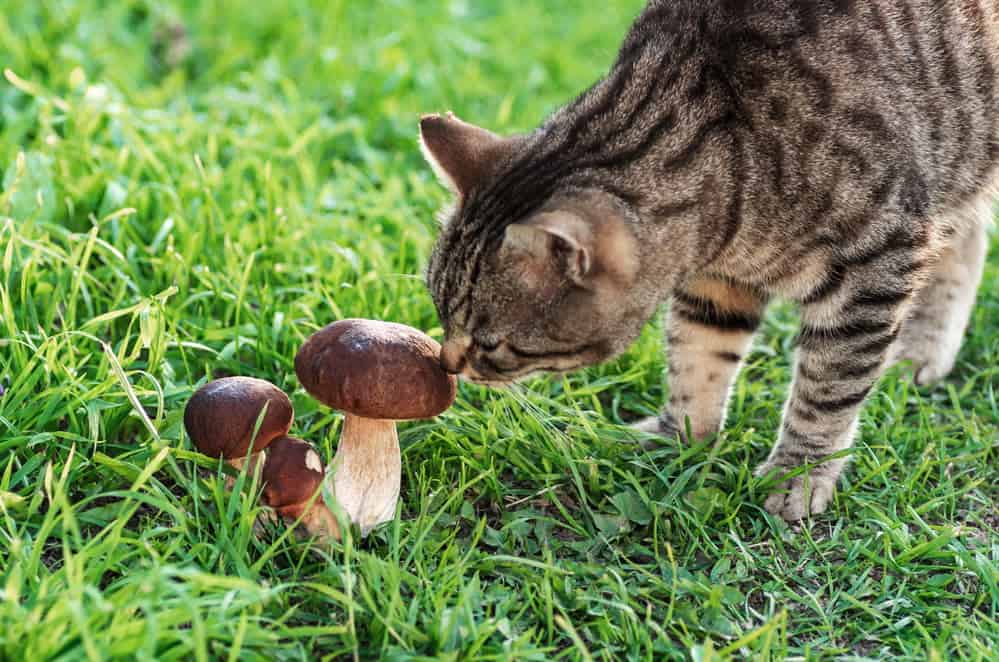Table of Contents
While cats are mostly carnivorous, they can eat edible mushrooms. This said, it is not recommended to feed your cat mushrooms as a regular part of their diet. Consult your veterinarian before feeding your cat new foods. Some wild mushrooms may be toxic to cats and potentially lethal.
Edible Mushrooms are NOT poisonous to Cats
If you ended up here because your cat ate some of your cooked mushrooms, know that your cat will be fine. At the very worst, your cat will suffer mild stomach discomforts due to oils, salts, and other spices.
Cats may suffer Complications after eating Mushrooms if:
- Your cat ate raw mushrooms or mushrooms with lots of oil and condiments. Also, if your cat has eaten numerous mushrooms. In these cases, your cat may suffer mild temporary discomfort.
- They are mushrooms of UNCONFIRMED identity. Some wild mushrooms can be toxic. While most ARE NOT deadly, some may require seeking medical attention.
- Your cat has consumed hallucinogenic mushrooms. This may cause intense discomfort and trauma to your cat. NEVER feed a cat hallucinogenic mushrooms.
- Your cat is acting unusual or has had a negative reaction after consuming mushrooms. You may want to consider contacting a veterinary professional under this circumstance.
What to do if your Cat ate wild or potentially toxic Mushrooms
Cats are usually pretty picky eaters. It is unlikely that they would eat wild mushrooms. If you have SEEN your cat eat wild mushrooms, then you may want to take some precautions.
- Remain calm. Your cat will probably be fine.
- Document the mushroom. Take photographic evidence of the mushroom in question. If possible, place an intact specimen in a paper bag. Avoid damaging it, as it may come in handy for identification.
- Head to your local veterinary professional. While it’s unlikely the mushroom in question is poisonous, it’s best to take precautions. Veterinary professionals will know the risks and how to properly manage the situation.
- Try to identify the mushroom. Not everyone is an expert at identifying mushrooms, but some resources can help. You can start with a Google search with the keywords “Poisonous Mushrooms of ________” filling it in with your region (country, state, country, etc.). Facebook groups can also help identify mushrooms. Click here for the group “Poisons Help; Emergency Identification for Mushrooms and Plants”. Also, search for local groups by searching for your region with the keyword mushroom. You can ask if there are any poisonous mushroom fruiting in your area at the moment if you have no pictures. There is also a list of North American volunteers who will help identify poisonous mushrooms. Click Here for the Volunteer List.
- Watch for symptoms, Wait for Identification, and Follow the Guidance of Your Vet. Your vet will know best as they may already have experience with poisonings in your local area
What to do if your Cat eats Magic Mushrooms
If your cat has consumed Magic Mushrooms, it may become incredibly unpredictable.
- Try to keep your cat indoors, in a kennel, or in a safe environment. Outdoors, they may get lost or injured.
- Do not try to caress, hold, or pet intoxicated cats. They may scratch and defend themselves from even their dearest friends.
- Attempt to calm it with soothing gestures. Use your own judgment for how to calm your cat.
- Wait for 3 to 4 hours until your cat has become sober. If ANY complications or doubts occur, take it to a veterinary professional.
Can you give Medicinal Mushrooms to Cats?
The effects of medicinal mushrooms on cats have not been thoroughly studied. Medicinal mushrooms are SAFE for most animals when properly dosed. Consult your veterinary professional before trying to treat your cat with medicinal mushrooms. NEVER give cats the recommended dose for human adults.

